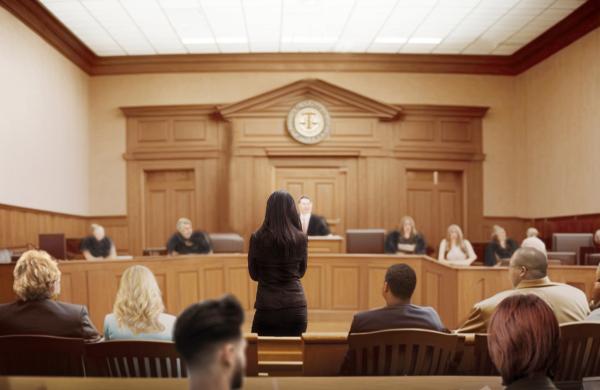The Witness Assistance Service (WAS) provides support and information for vulnerable victims and witnesses involved in criminal cases. The WAS is part of the ODPP and WAS officers are available to provide services through each of the ODPP offices.
Aboriginal and Torres Strait Islander WAS Officers can provide culturally appropriate support across the State to witnesses who are Aboriginal or Torres Strait Islander.
Who we are and what we do
The ODPP's Witness Assistance Service (WAS) provides a range of support services and information to vulnerable witnesses to reduce as much as possible the extra stress of being involved in a serious legal matter. WAS officers are social workers, psychologists or counsellors who understand both trauma and how the criminal justice system works.
If you a vulnerable witness and are called to court, this includes making sure you know what to expect on the day, so you are able to give your evidence as well as you can.
As well as helping you feel ready to give evidence, we can keep you updated on the progress of the court case you’re involved in, refer you to other services, and help you in other ways (see How we can support you below).
We are based in all ODPP offices around the State.
WAS’s involvement finishes when a court matter ends, but we can refer you to on-going community services if you require further support.
WAS officers are not lawyers, so can't give legal advice.
- How we can support you
Preparing to give evidence
If you, or someone you are supporting, have been called to give evidence and are eligible for WAS services, we can:
- go with you when you meet the ODPP prosecutor before the court date
- give you a tour of the court and explain who is who and what they do
- let you know the order in which things are likely to happen on the day
- talk to you about what to wear in court and about court behaviour, like bowing when you enter and leave the courtroom and addressing the magistrate or judge as ‘Your Honour’
- tell you about the special court arrangements available to vulnerable witnesses, such as giving evidence via CCTV or AVL
- if you are a support person, explain your role in court
- arrange an interpreter, if you need one
- if you have disability, make sure your needs are met.
On the day, we can meet you at the courthouse before you give your evidence, and talk to you afterwards about your experience and what happened in the case.
Court updates and debriefs
Most criminal matters take a long time to finalise, although some are dealt with more quickly. During this time, a matter can go before the courts many times, while there are also likely to be long periods when it feels like nothing is happening.
An important role for WAS is liaising with the prosecution legal team. We can keep you updated on the progress of your matter. We can also meet with you before major court dates, and debrief with you afterwards. We can help you prepare for decisions the courts may make, such as a verdict of not guilty.
Victim impact statements
After an offender is convicted, victims and witnesses harmed in crimes involving violence, sexual assault, death or injury, and family members and persons considered family members of victims who died as the result of a crime, will usually have the opportunity to make a victim impact statement (VIS). If you want to make one, we can provide information on how to prepare it.
Other support for victims
To support victims of serious crime in other ways we can:
- give you information on victims’ rights, and on financial and other assistance that may be available to you
- put you in touch with services, such as counselling, grief and bereavement, and sexual assault services
- after the offender is sentenced, give you information on victims’ registers so you can be notified of significant changes to their custody arrangements.
- Witnesses we can support
WAS supports adults and children who are victims, family members or witnesses for the prosecution in serious criminal matters.
We give priority to:
- children and young people under 18 years
- victims of sexual assault and serious domestic and family violence
- family members of victims who have died in driving or homicide cases
- people vulnerable through disability, age, or mental health.
- Aboriginal and Torres Strait Islander victims and witnesses
WAS has Aboriginal and Torres Strait Islander officers based throughout the State.
If you are an Aboriginal or Torres Strait Islander victim or witness and want support from an Aboriginal or Torres Strait Islander WAS officer, WAS will connect you with the officer for your area.
- Recognising the impact of crime
While all victims of serious crime react differently, common impacts include:
- an increased concern for personal safety
- trouble concentrating
- difficulty sleeping
- depression / moodiness
- going over the incident in your mind again and again, and thinking what you might have done differently
- financial difficulties, such as if you have been unable to work, or have had extra medical expenses
- conflict within a community.
If you are suffering these or any other harmful impacts of crime, we can refer you for counselling and other specialist support.
- Contact us
WAS officers are based in the ODPP’s head office in Parkline Place, 252 Pitt Street, Sydney, in Parramatta, Campbelltown and Penrith and in all ODPP regional offices – in Lismore, Newcastle, Gosford, Wagga Wagga, Dubbo, and Wollongong.
To contact WAS, ring 1800 814 534.
Easy Read
The aim of Easy Read is to simplify information. One idea per sentence is explained using plain language, with simple font, design and images. This helps more people to read and understand information.
You can access WAS information in the Easy Read format by clicking on the images or PDF documents below.


